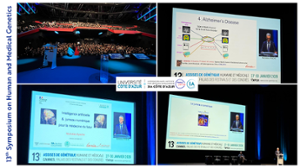on the November 4, 2022
Program
10:30 - 11:00
Lucia Innocenti (Inria)
Chair of Sebastien Ourselin
Analysis of Multi-centric AI-based frame-works in prostate segmentation
Prostate cancer (PCa) is the second most frequently diagnosed cancer in men worldwide.Several studies have investigated AI-based computer-aided diagnosis (CAD) for PCa diagnosis. This project aims at developing novel approaches for integrating AI-based CAD systems for patient selection and monitoring in multi-centric collaborative studies. Working with multi-center data in the medical field raises several issues related to the handling of sensitive data. The EU GDPR clearly states that data of this kind need special attention and cannot be shared among various entities except under specific assumptions. This is why Federated Learning (FL) has gained so much interest in the medical field in recent years. The FL approach is decentralized in terms of training data and on-device computations. During FL, raw data are stored on end-user devices, which work together to train a common model. On a central server, locally computed updates and analysis results are received and aggregated for an enhanced global model benefiting from distributed learning. Afterward, the updated model is shared with clients, so that knowledge can be shared. Considering the large number of papers published in FL for health care, the first question this project tries to answer is how useful a federated approach actually is. In fact, other embedding approaches have proven useful in similar contexts over the years. From these considerations, the purpose of this paper is to compare the results, obtained on the same conditions, of FL and consensus-based models in order to define cases where each of them is more convenient.Talking of results, our focus is not only on comparing the selected metric (that in this context,for our segmentation problem is the Dice Loss) but also on considering the costs of a modelin terms of CO2 emissions, training time, and, in future, also economic cost for a company. This project is developed in collaboration between Inria, 3IA, and KCL, under the supervision of professors Sebastien Ourselin, Marco Lorenzi, and Michela Antonelli.
11:00 - 11:30
Riccardo Taiello (Inria)
Chair of Marco Lorenzi
Privacy Preserving Image Registration
Image registration is a key task in medical imaging applications, allowing torepresent medical images in a common spatial reference frame. Current literature on image registration is generally based on the assumption that images are usually accessible to the researcher, from which the spatial transformation is subsequently estimated. This common assumption may not be met in current practical applications, since the sensitive nature of medical images may ultimately require their analysis under privacy constraints, preventing to share the image content inclear form. In this work, we formulate the problem of image registration under a privacy preserving regime, where images are assumed to be confidential and cannot be disclosed in clear. We derive our privacy preserving image registration framework by extending classical registration paradigms to account for advanced cryptographic tools, such as secure multi-party computation and homomorphic encryption, that enable the execution of operations without leaking the underlying data. To overcome the problem of performance and scalability of cryptographic tools in high dimensions,we first propose to optimize the underlying image registration operations using gradient approximations. We further revisit the use of homomorphic encryption and use a packing method to allow the encryption and multiplication of large matrices more efficiently. We demonstrate our privacy preserving framework in linear and non-linear registration problems, evaluating its accuracy and scalability with respect to standard image registration. Our results show that privacy preserving image registration is feasible and can be adopted in sensitive medical imaging applications.
11:30 - 12:00
Open discussion on the two contributions

